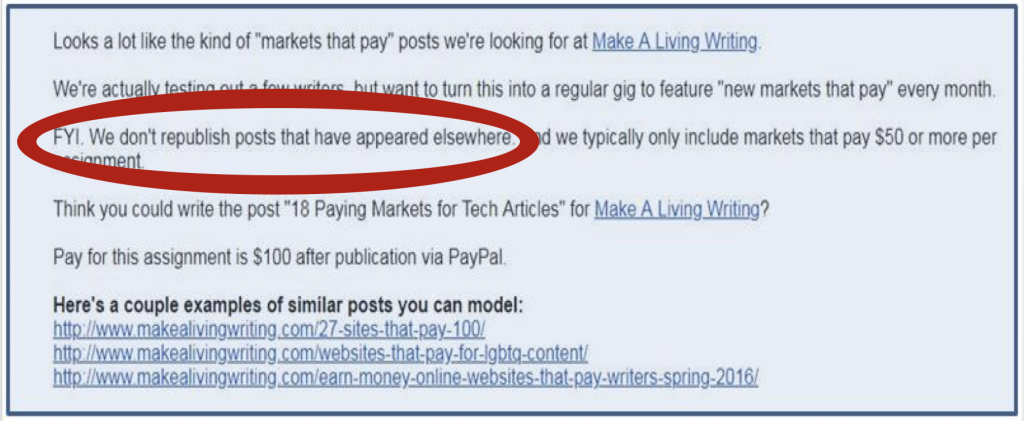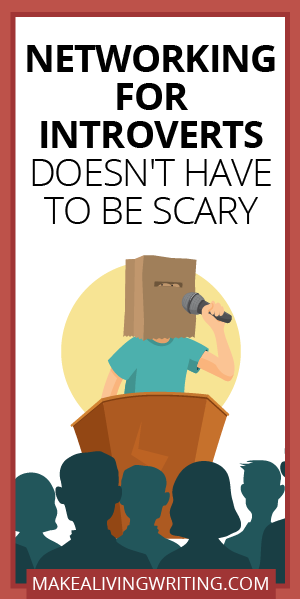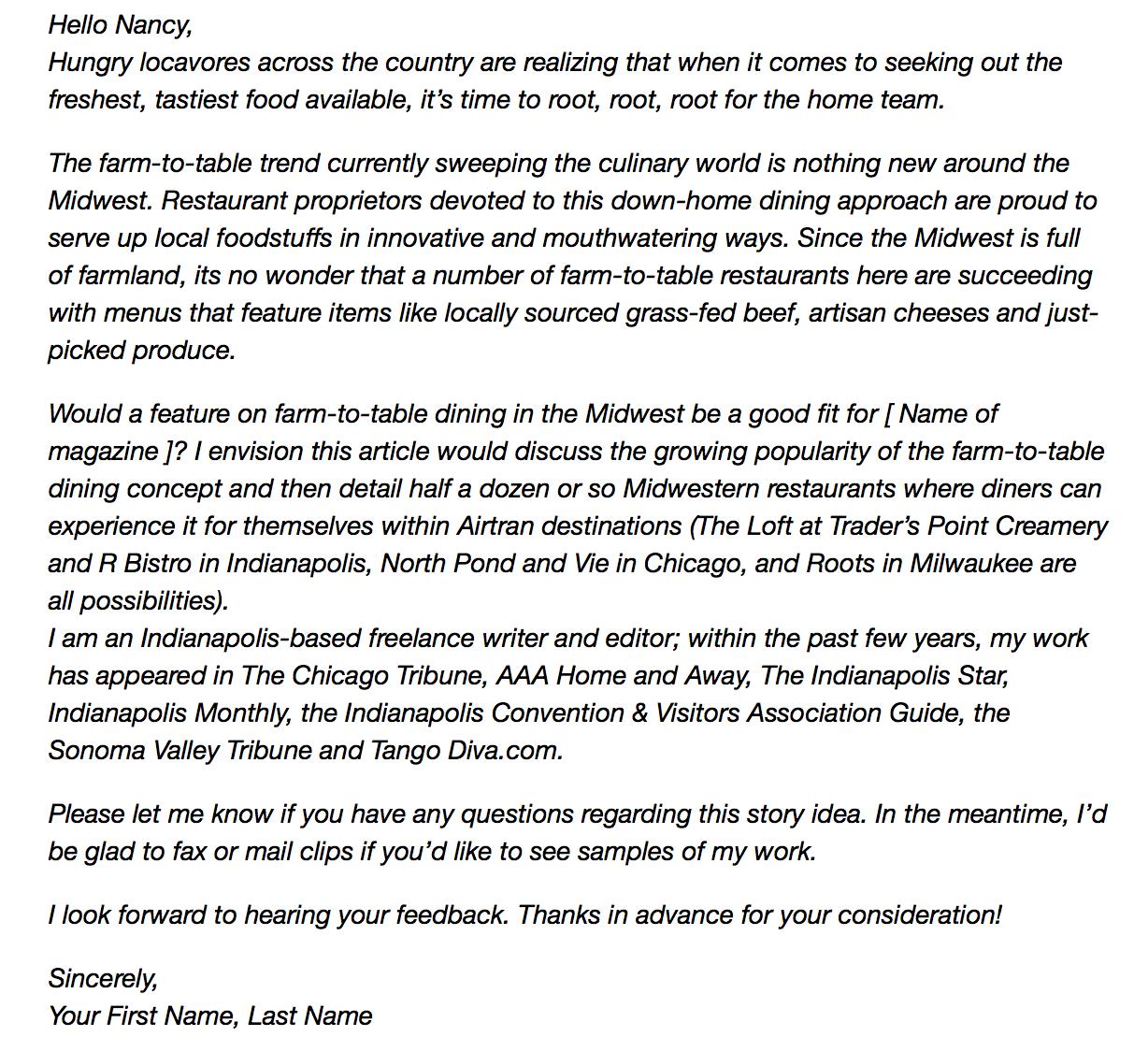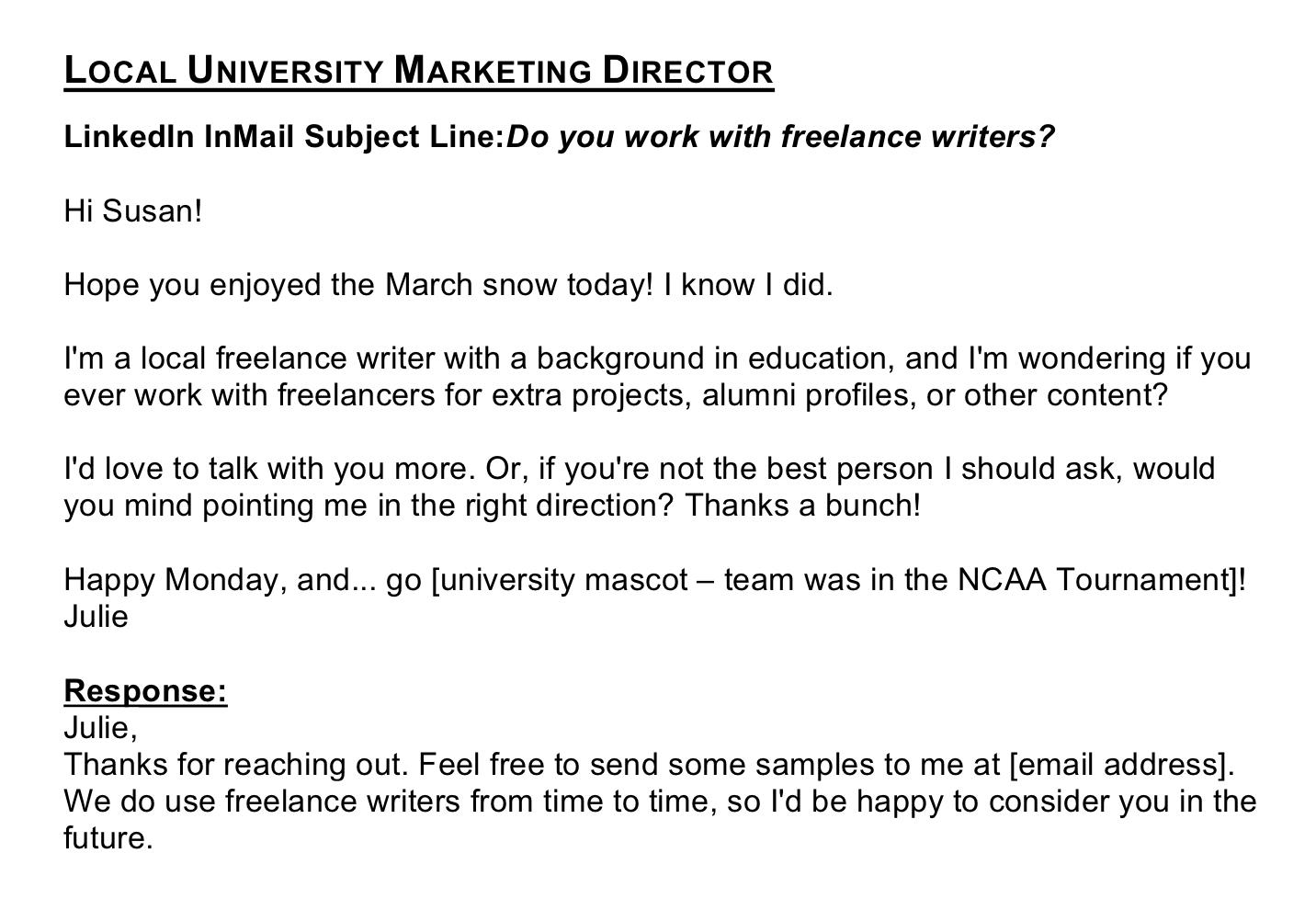 Have you ever wondered if you could sell reprints of your blog posts and make some extra cash? You know, get the posts you’ve written for your personal blog republished somewhere else.
Have you ever wondered if you could sell reprints of your blog posts and make some extra cash? You know, get the posts you’ve written for your personal blog republished somewhere else.
If so, my blog editor Evan Jensen and I have a cautionary tale for you.
Many bloggers seem to believe publishing a post on their own blog — or even on a free platform such as LinkedIn Pulse or Medium — doesn’t ‘count’ as publication. And that they could still get paid selling first publication rights to these posts.
Sometimes, writers don’t even feel they need to disclose the work was previously published.
This can result in an awkward mess, when the blog or publication you resold your work to figures out they’ve gotten recycled goods. I know, because this blog recently and inadvertently accepted previously published content.
As the queen says, we were not amused.
Here’s the story of what happened, and how my guest-posting policy is changing as a result. I’ve also got some important tips for bloggers considering trying to sell reprints.
It begins with lists
Here at Make a Living Writing, we’ve learned one of the most popular types of posts we can offer are lists of paying markets. I mean, obviously — help writers find some paying gigs, hello!
We also found they were tough posts to get written. We pay $75-$150 for these sort of research-based posts, but were having a hard time finding writers we could trust to do the research and bring us up-to-date, fresh listings.
Then one day, Evan got an email from a blogger with experience writing market-list posts. She sent in a list of her blog’s previously published posts, and asked if we’d like to reprint one of them.
Here’s Evan’s response:

Assignment gets a green light. The writer agreed to write us a fresh post. Thinking he’d given a clear edict to research and write us a fresh, new post on the same topic, Evan gave the green light for the writer to move forward on this assignment.
Note: This relationship would grow to encompass three list posts. But Evan would grow increasingly worried that perhaps, we weren’t really getting unique material.
Reprint suspicions
What made Evan start to wonder if posts submitted were original? Sometimes, instructions in the assignment hadn’t been followed.
He found himself doing a lot of quick research and rewriting in a hurry, to meet deadlines, and track down info like editor contact information, and insider tips on how to get published in these markets.
Our big miss
When one of the later posts got turned in, there was a single short line in it that, in the hustle-bustle of serving 80,000 readers a month, got overlooked. We would come to seriously regret that.
As you can see below, it was a hint that in fact, despite being specifically instructed to not give us any reprinted material, the guest post being turned in was at least partly cribbed from one of her existing blog posts:

Houston, we have a problem
Why is the discovery that we’d inadvertently accepted an (at least partial) reprint a problem for the Make a Living Writing blog? Because we don’t reprint anything ever, as a matter of policy (as Evan stated to this blogger off the bat).
My decade-old mission has always been to provide you with fresh content you won’t find anywhere else. So this was a problem.
The trouble with reprints on the Internet
Reprinted content both angers Google — which may view the duplicate content as a sign of a lower-quality site, and serve it up less in search results — and bores readers. Nothing like reading a post you feel you’ve seen somewhere before to make you feel like unsubscribing, yes?
Start digging
Finally, Evan hopped on the Internet and started doing some searches. He turned up not only highly similar posts on the author’s blog, but similar posts she’d published on Medium and LinkedIn Pulse as well.
We confront the author
At this point, we circled back to the author to express our unhappiness with being handed reprints — or at best, what appeared to be re-spun versions of previous content. We were hopping mad to find that we’d paid for first and reprint rights to previously published content.
Her reaction: She was deeply offended that we were offended.
Her contention?
Repeatedly quoting writers’ guidelines from blogs and publications, she said, didn’t make it duplicate content. More importantly, it was fine for her to accept our check for this version of the post, because she ‘retained all rights.’
And that’s how we learned how much confusion there is out there, about reselling blog posts.
Reselling first rights?
This author put herself forward as an experienced professional editor. She knew what she was doing. But here’s the problem…
When you publish a post, that venue has first publication rights. The work has now been published.
You cannot resell or license first publication rights. They only attach once, to one publication. That’s why they call ‘em ‘first rights.’
Contrary to what many bloggers think, your personal blog is a publication. Medium is a publication.
That means we paid good money for rights we couldn’t really have. The rights purchase we state on our writers guidelines page also states that we retain the right to reprint our posts.
But in this case, we couldn’t really own those reprint rights, either. The author assured us that in publishing posts on her own blog, she owned the reprint rights.
We’d been hornswoggled, in Old West terms. Lacking a time machine to go back and simply not do business with this writer, we began grappling with how to make it right.
Unbreaking an egg
First off, I felt seriously upset about betraying readers’ trust that we always provide fresh content.
But I also worried about quietly removing the offending posts, which would break links readers might try to use in the future to reach the market lists. Broken links suck!
At one point, I requested that my payments be refunded, in exchange for which we would delete the posts, after disclosing the problem to our readers. But the author declined to send back my money.
So here’s what we’ve done
- We’ve removed two of the posts. Analysis showed they weren’t continuing to get a lot of traffic, so hopefully that doesn’t bug too many readers.
- On the third one, we posted a disclosure. This one was our bad, as we accepted this post after we received (but missed) the disclosure that — despite being expressly told not to send us duplicate content — the author turned in partly recycled content.
Sometimes, when you mess up, there’s no way to unbreak the egg. But admitting you messed up is important. So that’s what we’ve done.
The truth about self-plagiarism
Some writers believe that it’s OK to plagiarize yourself. After all, who’s going to object? That’s exactly what this writer told us, “It’s OK with me, so it’s OK.”

But that’s wrong. She may own the rights, but many of those rights are no longer available for resale.
Clearly, the first rights to these works were gone, and the author also wanted to retain ownership of the reprint rights. But we thought we’d paid for both of those.
It’s not OK to turn in re-spun content when you’ve been expressly told a market does not accept reprints. That put us in the position of falling short on our mission to always present fresh, original content to our readers.
This author also expressed her disdain that we had the right to care whether her post was partially a reprint, because she felt we didn’t pay enough to earn that right. But paying $1 gives you the right to original content, if that’s what you commissioned.
Can you get stung by plagiarizing your own work?
As it happens, I’ve seen a staff writer fired and marched out the door for self-plagiarizing. She handed in a lightly rewritten company profile twice over — once for a special section, and again to the news department, both at the business journal where we both worked.
The editors compared notes, and she was history. Her reputation was ruined, and she never worked in editorial again. Obviously, a slightly different scenario, but I think it highlights the fact that yes, it is possible to plagiarize yourself — and that everybody’s not OK with that.
If you know a blogger who’s unclear on this, please spread the word.
Self-plagiarism is still plagiarism. And it’s wrong.
It’s doubly wrong when you’ve specifically been told not to do it, but you decide to do it anyway.
A hasty disclosure that you partly cribbed off your own past work, after the fact — when the deadline has arrived and the post is done, perhaps in hopes it will be overlooked, as in our case it was — does not square you.
The exception would be reprinting your content in another free venue that accepts reprinted content. Medium and LinkedIn’s blog are two popular venues for this. Nobody’s been deceived there, and no money changed hands.
Our new policy for guest posts
How can we prevent this duplicate-content problem from happening again?
Maybe we can’t — I know more than one blog that’s stopped accepting guest posts because of the challenges of detecting re-spun junk.
- Here’s an example from Kristi Hines, founder of the popular blog Kikolani, who shut down guest posts there years ago, after discovering she’d been duped with duplicate content submissions. Reporting the trend for the now-defunct BlogWorld conference, she notes that thousands of other blogs have done the same.
- Also, at least one popular blog closed their guest list, and now only accepts posts from their past guest posters, whom they know and trust. Read Copyblogger’s updated guest post guidelines.
I don’t want to end guest posts
I think our guest posters provide vital, fresh voices and innovative ideas on how to earn more. I’ve paid out thousands of dollars annually to guest posters for many years, and want to continue to be a paying market for writers.
But in an effort to prevent self-plagiarism, we’re changing how we work with guest posters.
In analyzing our own process of accepting guest posts, the problem we turned up during these unpleasant revelations is this: We weren’t getting signed contracts from guest posters.
Until now, we’ve allowed our writers’ guidelines page to spell out our rights and rules. We trusted that we didn’t need to get writers’ signature to avoid getting recycled or reprinted material pawned off on us.
That ends now — our guest-post authors going forward will sign a contract for their post. We’re hoping that having to sign a statement that you’re not handing us previously published work will help writers understand how important unique content is to us.
Mea culpa
On behalf of Evan and myself, I sincerely apologize for not keeping a sharper eye on the guest-post content we receive. Trust me, we’re on it now.
I hope going public with our guest-post travails helps bloggers who are also freelance writers to understand the right and wrong ways to go about offering their previously published posts for resale.
Few markets are interested in reprints these days, thanks to the Google/duplicate-content problem. Make sure you’re pitching one, if you’re offering to resell your blog posts.
What else can we do to stop duplicate content? Let’s discuss on Facebook and LinkedIn.

The post We Got Stung: Must-Know Info for Bloggers Who Offer Reprints appeared first on Make A Living Writing.
from Make A Living Writing https://ift.tt/2vgyoQh
 I knew I had to figure out the marketing piece if I hoped to be a successful freelancer, but networking for introverts? and Self-promotion isn’t exactly my favorite thing to do.
I knew I had to figure out the marketing piece if I hoped to be a successful freelancer, but networking for introverts? and Self-promotion isn’t exactly my favorite thing to do.

 How do you go about writing a pitch?
How do you go about writing a pitch?



 Photo by
Photo by 












 Every week, I hear from people who ask me how to become a freelance writer.
Every week, I hear from people who ask me how to become a freelance writer.

 It’s good to keep your small things like toothpicks, toothpaste, and toothbrushes in a glass jar. If you do not have a specific space to keep your small things in the bathroom you might need to keep finding it in time.
It’s good to keep your small things like toothpicks, toothpaste, and toothbrushes in a glass jar. If you do not have a specific space to keep your small things in the bathroom you might need to keep finding it in time. You don’t need to dig holes in the wall to create rail to put your towel. Use a small decorative ladder for a beautiful finish instead.
You don’t need to dig holes in the wall to create rail to put your towel. Use a small decorative ladder for a beautiful finish instead. The best part of freelance writing—and the worst part—is being your own boss. There’s nobody else standing over you, forcing you to calculate every minute to measure productivity.
The best part of freelance writing—and the worst part—is being your own boss. There’s nobody else standing over you, forcing you to calculate every minute to measure productivity. Photo by
Photo by 









 Have you ever wondered if you could sell reprints of your blog posts and make some extra cash? You know, get the posts you’ve written for your personal blog republished somewhere else.
Have you ever wondered if you could sell reprints of your blog posts and make some extra cash? You know, get the posts you’ve written for your personal blog republished somewhere else.

